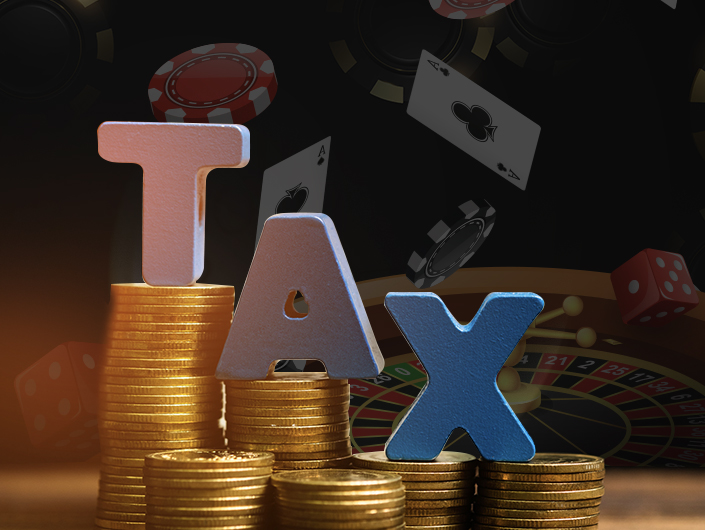
Gambling Tax Norms that Casino Gamblers should know about!
Playing at an online casino is one of the favourite hobbies for more than 28% of the world’s population, according to a recent study. The reasons for this are obvious – not only is it entertaining, but it also provides an opportunity for gamers and players worldwide to try their luck and win major cash. If you are one of the happy-go-lucky ones, there is no doubt that you will love online casino gaming.
The casino gaming industry is growing at a steady pace and is already a billion-dollar industry. Taxes from casino gaming and winnings from casino gaming makes considerable revenue for governments worldwide.
Anything that is commercial or helps you make money is taxed by the government, and this is a common thumb rule globally. But when it comes to Casino winnings and the various Online and Offline casinos that operate globally, the laws and policies differ from one country to another. The reason for this is that some governments want more casinos to operate and flourish, while others may want to restrict and control the movement of money in terms of stakes and winnings. Based on these two criteria, Casinos and the winnings on casinos may or may not be taxed by the government.
When it comes to the UK, the laws and policies with regard to taxation on casinos and casino winnings, which is referred to as the UK Gambling Tax, are more relaxed and liberal. Countries such as Germany, Canada, Australia etc., also have a liberal tax policy when it comes to Gambling winnings.
On the other hand, countries like India, the US and some European Countries exercise heavier taxation on Gambling winnings and for casinos to operate. These taxes can either be directly on the gambling winnings, the stakes-placed (which are passed on to the casinos), on inheriting such winnings or when gifted to others.
 Taxation on Gambling activities in the UK
Taxation on Gambling activities in the UK
In the UK, the taxes on Gambling activities are simple and easy to comprehend. UK punters do not have to disclose their gambling activities or winnings to the government as the UK government does not recognise GamblingGambling as a commercial or trade activity. Since there is no such thing as Income from Gambling activities, players do not need to pay ANY taxes on winnings from Gambling activities in either form, physical or online casinos.
Even though there are no direct taxes on Gambling Activities, taxes may be imposed in other forms. There are two ways in which the UK government imposes a tax on gambling winnings in an indirect way:

Gift Tax
Gift Taxes are imposed on Gambling winnings that are ‘gifted’ to a family member, friend or any loved one. Winnings that are gifted are taxable by both parties – the sender and the receiver of the money.
Inheritance Tax
The Inheritance tax is imposed on heirs of a player/individual who passes on their wealth in the form of money or as part of your estate. This tax is mostly imposed on the receiver of the inheritance rather than the person who owns the winnings.
Income Tax
Some players or punters are professionals and use gambling activities as a source of Income. Winnings that become a source of Income for such professional or full time punters are treated as Income and need to be disclosed to the government and pay appropriate income taxes.
 UK Gambling Taxes on Casinos
UK Gambling Taxes on Casinos
Casinos are commercial institutions and traders that need to pay taxes to the government. In the UK, up until 2001, there was something referred to as ‘Betting Duty’ that all casinos needed to pay to the government. This was a flat 6.7% that was charged to operators of a casino, mainly Brick-and -mortar formats of casino and gambling operators. This duty was initially passed on to casino players at the rate of 9% of their winnings by the casino operator to compensate for the duty that they paid.
This duty was replaced by a 15% levy that was charged on UK bookies, which made them pay a heavy tax on their gross profits but also supported punters in the UK, leaving them tax free. But this practice discouraged casino operators as more people started making a move to cheaper countries such as Malta, Gibraltar, Isle of Man etc. The tax was imposed on UK sites as a point of supply tax form and not for offshore casinos, which made a disparity in the revenue casinos in the UK and offshore casinos made.
Soon, the UK government replaced this tax by amending the policy and charging a Point of Consumption tax that replaced the Point of supply tax. What this means is that for all casino operators, no matter where they came from or if they were operating online or offline, a flat 21% tax was imposed, leaving punters in the UK tax-free. This was a great move as it resolved the disparity in tax format amongst different kinds of casino operators and also encouraged more casinos to operate in Uk and more people to play at casinos in the UK, in turn boosting the revenue of the country.
The casino gaming and gambling industry are at an all time high, recording a whopping 11% growth in the last 2 years (2020 to 2022) – it is currently standing at a 1620M Pounds revenue which is the highest ever. The UK government earns a good tax revenue over the gross profits made by casinos in the form of Remote Gaming Duties currently at the rate of 28% and Machine Gaming duties in a range that varies between 5% to 25% based on the gaming facility. Lottery duty and scratch cards are also charged on the stakes at a flat 12% rate, all of which contributes to the Tax revenue from chance-based games in the UK.
 Benefits of playing at a UK Casino Online
Benefits of playing at a UK Casino Online
For punters, choosing a UK casino is much better when comparing the best UK online casinos to other countries such as India, the USA, New Zealand and some European countries. In the UK, game-of-chance, such as Online casinos, Bingo, Lottery and scratch cards and other machine-based games, are all exempt from taxes when it comes to gambling winnings. The taxes are absorbed by the operators and the provider of services rather than the players’ winnings. This makes playing at a UK-based online casino a favourable destination for punters and players worldwide.
Even when it comes to players outside the UK, no Gambling tax is charged on the winnings made by tourist punters playing in the UK, but the winnings may be charged by the native country when they are credited back to the account. So as tourists, players must be aware of the gambling taxes in their own countries but do not have to worry about paying a double tax in the UK as a host country.
Small taxes or fees are charged by the payment method that is opted by the player while playing at the online casino sites. Payment methods such as Paypal may charge punters abroad for conversion of currency rates along with a small fee for withdrawal made into the account. Other banking methods such as Bank transfers or Cards such as Visa and Mastercard also charge a small fee when transferring huge withdrawals into the banking account. Some online casinos may also charge a fee internally for withdrawals above a certain amount and frequency of withdrawal.
Sports Betting, which is a popular form of betting in the UK, is also exempt from taxes allowing punters worldwide to participate in global sports markets and place bets. Online and offline bookies in the UK provide a huge variety of games that can be bet on by players worldwide, and the winnings are exempt from taxes. The standard taxation policy that is imposed on operators applies to Sports bookies as well. This is why the UK is a haven for sportsbook lovers worldwide.
To conclude, the UK Gambling Tax is much simpler than most countries allowing punters in the UK and even tourists to gamble tax-free in the UK. The UK Gambling Tax is amended with taxation policy at the Point of consumption which makes the operators absorb all the taxation providing a tax-free experience to punters in the UK.
It is to be noted that there are other forms of taxes that may be applicable to the winnings from the GamblingGambling, such as Gift Tax, Income Tax and Inheritance Tax based on a case-to-case scenario. Foreign tax laws are applicable on winnings that are made in a UK casino for tourist players who would like to withdraw their winnings to their home country accounts.
